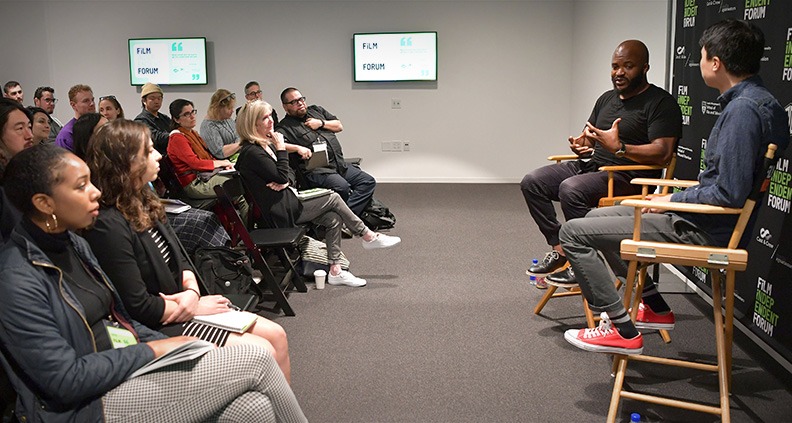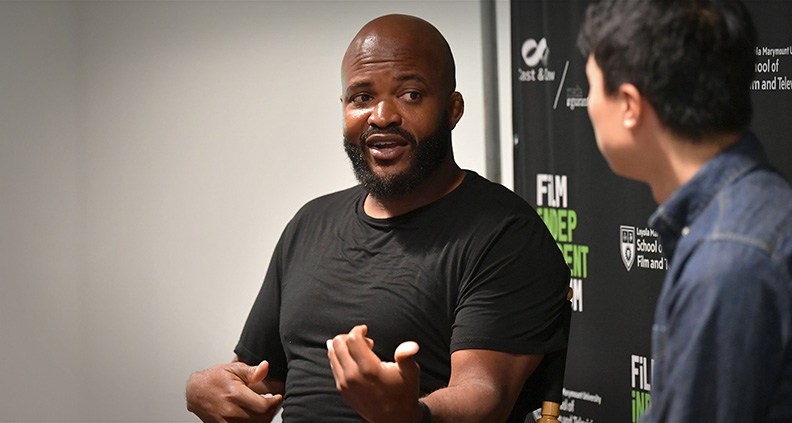Bing Liu and Sal Masekela Dig Deep on ‘Minding the Gap’ in Doc Keynote
It’s 10:00 am on Saturday morning, April 27 at LMU’s new Playa Vista campus, Day Two of the 2019 #FiForum19. A group of cinephiles and filmmakers have filled Room 4 and the Forum’s documentary keynote conversation—between beloved sports commentator, journalist and Emmy-nominated TV producer Sal Masekela and Film Independent Documentary Lab Fellow, Spirit Award grant winner and Oscar nominee Bing Liu (Minding the Gap)—is about to begin.
Liu’s story certainly is eye-catching. He went from “Illinois-teen-shooting-skate-videos-with-his-friends” to the director and producer of a critically-acclaimed, multi-award-winning documentary feature; one that A.O. Scott of The New York Times called “a rich, devastating essay on race, class and manhood in 21st-century America”—a narrative that has all the hallmarks of one of those mythical tales of overnight Hollywood success.
But Liu is first person to push back on the narrative, instead telling you what a long road it’s been from those early days shooting video at local skate spots with his friends.

Liu even literally fell into filmmaking by accident. No, really—he broke his arm when he was 14, and as a result became the “filmer” among his group of skater friends, which he said “sort of turns you into the dad of the group. You have to take care of the [skate spots] so you bring a broom. You get Quickrete and fix cracks.” It was good training, he said, for becoming a producer. “It is a weird film school, but it doesn’t feel like school, because I was doing it for the love of it.”
Liu began to develop his ideas about storytelling a few years later when he watched two Richard Linklater films: Waking Life (2001) and Slacker (1990). He experimented with a number of projects attempting to emulate what he’d seen in those films, although he admits that at the time he wasn’t thinking of becoming filmmaker. “I just saw [it] as an extended form of play.”
There were two short docs Liu produced preceding Minding the Gap. One focused on family drama and finding one’s identity as an American. The other was about the relationship between skateboarding and photography. He was contemplating what effect filming might be having on skateboarding. Liu theorized: “I think those two things were brewing thematically in my head. So I wanted my next short film project to be about skateboarding and family life, and how that affected growing up.” And so he began going around the country filming skaters for his next project, which would eventually become his own much more personal debut, Minding the Gap.
Masekela asked Liu why he thought some young men seem to gravitate to skateboarding as their refuge from a challenging home life. Said Masakela: “In order for you to become good at skateboarding, you have to break yourself. You have to learn how to fall. And you do it over and over again.” Said Liu: “I think it’s about feeling a sense of control. Like in skateboarding, when you fall at least it makes sense. There’s physics. You can look at what you maybe did wrong and what you can do right on the next try. There’s the opportunity for validity”—as opposed to the chaotic and senseless environment of an abusive home.
Masekela praised the intimacy of Liu’s camerawork in shooting his subjects. “Many times [in the film], until you [Liu] speak, I forget you’re in the room. There’s a way that you move [the camera] and the comfort that you seem to have, I forget that you’re shooting.”
Liu explains that his camerawork is, in a way, an expression of his personality. He explains that he’s a reserved and “kind of shy” person.

There is an unexpected emotional honesty to Minding the Gap. And according to Liu, it took a while to figure out ow to make the film feel authentic to the experience of growing up. Patience was key. Six months before the film was completed, Liu tried something in the film’s edit he hadn’t attempted before: working on film subjects Keire and Zack’s stories individually.
So he focused solely on their separate character arcs. “Keire wants to move out of Rockford. Keire needs a job. He needs to save money. Here are the obstacles.” When he was done he saw that he had kind of a different film, one with clearer stories for each of his two primary characters (three, including Liu.)
Before this last editing exercise, Liu felt that for himself he’d already fulfilled the reason why he had wanted to make the film. But he was still searching for how to make others feel some of what he had felt from the filmmaking process. So he was totally open to taking this leap into the creative unknown—and it paid off.
At the end, Masekela said it best: “It was a gift getting to have this conversation with you this morning.” For an overcast Saturday morning, it sure beats cartoons.
Minding the Gap is now available to stream, only on Hulu. The 2019 Film Independent Forum takes place April 26-28, 2019 at the new LMU Playa Vista campus in the heart of Silicon Beach—click here to learn more.
The 2019 Film Independent Forum is supported by Premier Sponsors SAGindie, Cast & Crew and University Partner Loyola Marymount University School of Film and Television.